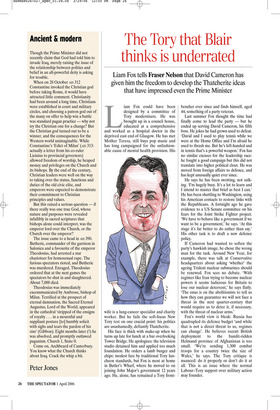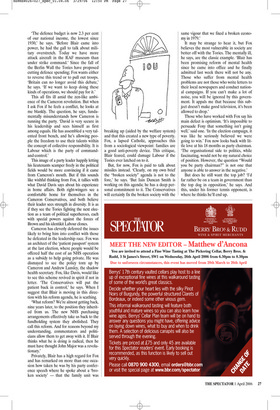The Tory that Blair thinks is underrated
Liam Fox tells Fraser Nelson that David Cameron has given him the freedom to develop the Thatcherite ideas that have impressed even the Prime Minister Liam Fox could have been designed by a committee of Tory modernisers. He was brought up in a council house, educated at a comprehensive and worked as a hospital doctor in the deprived east end of Glasgow. He has met Mother Teresa, still buys pop music and has long campaigned for the unfashionable cause of mental health provision. His wife is a lung-cancer specialist and charity worker. But he fails the soft-focus New Tory test on one crucial point: his politics are unashamedly, defiantly Thatcherite.
His face is thick with make-up when he turns up late for lunch at a bar overlooking Tower Bridge. He apologises: the television studio detained him and applied too much foundation. He orders a lamb burger and chips: modest fare by traditional Tory luncheon standards, but Fox is most at home in Butler’s Wharf, where he moved to on joining John Major’s government 12 years ago. He, alone, has remained a Tory front bencher ever since and finds himself, aged 44, something of a party veteran.
Last summer Fox thought the time had finally come to lead the party — but he ended up serving David Cameron, his fifth boss. He jokes he had grown used to defeat. ‘David and I used to play tennis while we were at the Home Office and I’m afraid he used to thrash me. But he’s left-handed and in tennis that’s a powerful weapon.’ Fox has no similar excuses for the leadership race: he fought a good campaign but this did not translate into higher political clout. He was moved from foreign affairs to defence, and has kept unusually quiet ever since.
He says he has been swotting, not sulking. ‘I’m hugely busy. It’s a lot to learn and I intend to master that brief as best I can.’ He has been shuttling to Washington, using his American contacts to restore links with the Republicans. A fortnight ago he gave evidence to a US Senate committee on his fears for the Joint Strike Fighter project. ‘We have to behave like a government if we want to be a government,’ he says. ‘At this stage it’s far better to do rather than say.’ His other task is to draft a new defence policy.
If Cameron had wanted to soften the party’s hawkish image, he chose the wrong man for the task. Around New Year, for example, there was talk at Conservative headquarters about asking ‘whether’ the ageing Trident nuclear submarines should be renewed. Fox sees no debate. ‘With regimes like Iran trying to become nuclear powers it seems ludicrous for Britain to lose our nuclear deterrent,’ he says flatly. ‘The onus is on the abolitionists to tell us how they can guarantee we will not face a threat in the next quarter-century that would require us to deter it, if necessary, with the threat of nuclear arms.’ Fox’s world view is bleak: Russia has quadrupled its defence budget ‘and while that is not a direct threat to us, regimes can change’. He believes recent British deployment to the bandit-ridden Helmand province of Afghanistan is too small. ‘We’re sending 1,300 combat troops for a country twice the size of Wales,’ he says. The Tory critique is nuanced: do it properly or don’t do it at all. This is an issue where the normal Labour–Tory support over military action may founder. ‘The defence budget is now 2.3 per cent of our national income, the lowest since 1930,’ he says. ‘Before Blair came into power, he had the gall to talk about military overstretch. Today we have more attack aircraft in the RAF museum than under strike command.’ Since the fall of the Berlin Wall the Tories have proposed cutting defence spending; Fox wants either to reverse this trend or to pull out troops. ‘Britain can no longer avoid this debate,’ he says. ‘If we want to keep doing these kinds of operations, we should pay for it.’ This all fits ill amid the zen-like ambience of the Cameron revolution. But when I ask Fox if he feels a conflict, he looks at me blankly. The question, he says, fundamentally misunderstands how Cameron is running the party. ‘David is very secure in his leadership and sees himself as first among equals. He has assembled a very talented front bench, and he’s allowing people the freedom to use their talents within the concept of collective responsibility. It is Labour which is the party of commandand-control.’ This image of a party leader happily letting his lieutenants scamper freely in the political fields would be more convincing if it came from Cameron’s mouth. But if this sounds like wishful thinking from Fox, it tallies with what David Davis says about his experience in home affairs. Both right-wingers see a comfortable home for themselves in the Cameron Conservatives, and both believe their leader sees strength in diversity. It is as if they see the Tories fighting the next election as a team of political superheroes, each with special powers against the forces of Brown and his identikit Labour clones.
Cameron has cleverly deferred the issues likely to bring him into conflict with those he defeated in the leadership race. Fox was an architect of the ‘patient passport’ system at the last election, where people would be offered half the cost of an NHS operation as a subsidy to help going private. He was dismayed to see the policy torn up by Cameron and Andrew Lansley, the shadow health secretary. Fox, like Davis, would like to see this scheme revived in spirit if not in letter. ‘The Conservatives will put the patient back in control,’ he says. When I suggest that Blair is moving in this direction with his reform agenda, he is scathing.
‘What reform? We’re almost getting back, nine years later, to the position they inherited from us. The new NHS purchasing arrangements effectively take us back to the fundholding system they abolished. They call this reform. And for reasons beyond my understanding, commentators and politicians allow them to get away with it. If Blair thinks what he is doing is radical, then he must have thought John Major was a revolutionary.’ Privately, Blair has a high regard for Fox and has remarked on more than one occasion how taken he was by his party conference speech where he spoke about a ‘broken society’ — that the family unit was breaking up (aided by the welfare system) and that this created a new type of poverty. Fox, a lapsed Catholic, approaches this from a sociological viewpoint: families are a good anti-poverty device. This critique, Blair feared, could damage Labour if the Tories ever latched on to it.
But, for now, Fox is paid to talk about missiles instead. ‘Clearly, on my own brief the “broken society” agenda is not to the fore,’ he says. ‘But Iain Duncan Smith is working on this agenda; he has a deep personal commitment to it. The Conservatives will certainly fix the broken society with the same vigour that we fixed a broken economy in 1979.’ It may be strange to hear it, but Fox believes the most vulnerable in society are better off with the Tories. The mentally ill, he says, are the classic example. ‘Blair has been promising reform of mental health since he came into office and he finally admitted last week there will not be any. Those who suffer from mental health problems are not those who write letters to their local newspapers and conduct national campaigns. If you can’t make a lot of noise, you will be ignored by this government. It appals me that because this subject doesn’t make good television, it’s been allowed to drop.’ Those who have worked with Fox say his main defect is optimism. ‘It’s impossible to persuade Foxy that something isn’t going well,’ said one. ‘In the election campaign, it was like he seriously believed we were going to win.’ Fox now looks back with little love at his 18 months as party chairman. ‘The organisational side to politics, while fascinating, would not be my natural choice of position. However, the question “Would you be party chairman?” is not one that anyone is able to answer in the negative.’ But does he still want the top job? ‘I’d far rather be on a team in government than the top dog in opposition,’ he says. And this, under his former tennis opponent, is where he thinks he’ll end up.



























































































 Previous page
Previous page